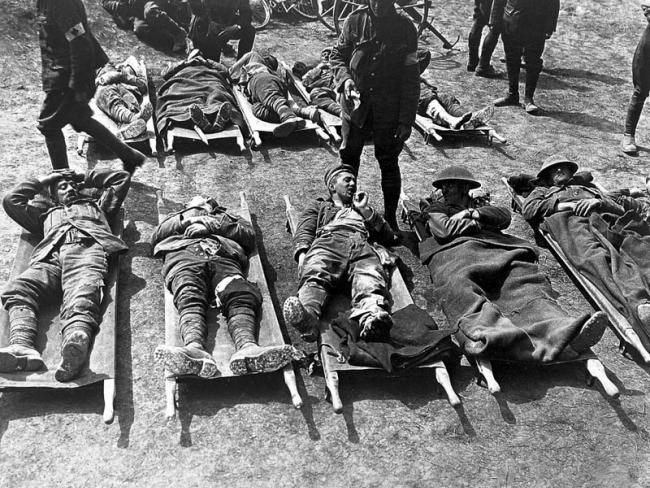Today’s world situation is similar to that of the pre-1914 years when imperialist forces were also intent on dividing up the planet’s resources…
A longer version of this article, The inexorable road to World War One, is also available online.
World War One scarred the twentieth century. It was colossally destructive of human life with an estimated death toll of over 16 million people. Millions suffered disabling injuries and devastating psychological traumas as well.
How can this violent eruption into general war be explained? Was there an underlying reason that caused this gigantic conflict? Or was it down to an unfortunate combination of unnecessary military adventures?
Certainly the cause of the first world war was neither the assassination of an archduke in Sarajevo, nor the invasion of Belgium. These and similar explanations were no more than convenient excuses and trite pretexts to justify the ruling classes’ clamour for war and to obscure their real motives.
The real answers can be found in the 60 or more years preceding the outbreak of warfare in 1914. During this period all the great powers, both old and emerging, experienced a fundamental economic shift.
Great monopolies and giants in industry and finance had emerged. At some point their predatory and conflicting interests and objectives were bound to provoke wholesale war. Only the intervention of the peoples of the world to stop the momentum of the system of world capitalism could have prevented it. Unfortunately, nothing was forthcoming until the October Revolution in 1917.
From about 1860, the method of organisation of capitalism had changed drastically. The economies of the great powers outgrew and discarded free competition. Production became concentrated amid massive technological development and a remarkably rapid growth of industry in ever-larger enterprises.
That concentration led inexorably to the domination of monopoly enterprises over national economies. And the banks played a large part in this process, acting in a significantly different way from their earlier role of enabling trade and settling accounts.
As banking developed, it too became concentrated in a smaller number of establishments. Banks became supremely powerful monopolies controlling almost the whole of money capital as well as the larger part of the means of production and the sources of raw materials. Capital itself became the commodity to be traded – finance capital was born.
Monopolies
The sway of finance capital accelerated and intensified the trend for concentration of capital and the formation of monopolies. Inside each great power a few monopolists could and did subordinate the leading economic operations, both commercial and industrial, to their will.
Empires have existed throughout history. But with the transformation of capitalism into capitalist imperialism between 1860 and 1914, a new type of empire was born. This beast aggressively combined class war against workers domestically with the oppression and exploitation of those in foreign lands. Over the years the word imperialism has tended to be used only and loosely in describing actions in foreign lands, whereas it should apply equally to the capitalist heartlands as well.
What were the noticeable features of this new capitalist imperialism? Industrial production had become more concentrated and capital more monopolistic; these twin forces exerted a decisive dominant role over economic life.
‘The heady mix of great powers provided the perfect ingredients…’
Bank capital, once concentrated, merged with or subsumed industrial capital until oligarchies of finance capital were created. In marked contrast to the export of goods and commodities in earlier phases of capitalism, the export of capital across the world acquired exceptional importance.
These new international capitalist combines were impelled to either share the world between themselves, or to compete as rivals for mastery. Inevitably, their growth generated a bitter rivalry for the territorial division of the whole world between the biggest capitalist powers.
This headlong growth of imperialistic capitalism opened up an unsettled phase of increasing danger among the nations of Europe. It unleashed events and forces on the part of the competing powers that ultimately created the conditions for general warfare.
Domination
Five great powers dominated in Europe in the 100 years before 1914, namely Austria-Hungary, France, Germany, Great Britain and Russia. Elsewhere in the world, USA and Japan were up-and-coming great powers. Both had made startling industrial and financial developments in the decades immediately before 1914.
This heady mix of great powers – some well established, some new and rising, others relatively declining – provided the perfect ingredients for the outbreak of imperialist clashes in a world ripe for war.
The early years of the twentieth century saw a massive upsurge in working class struggle in many countries as people combatted the domestic effects of imperialism. With the advent of world war, there was a terminal and immediate collapse in class struggle; workers started killing each other in warfare instead.
Rogue patriotism became the norm; this served the interests of finance capital and increased its spheres of influence. Workers – at least to start with – fell for the duplicity of engagement in “just wars”, which is an illusion.
There is nothing “just” about war. War is always an abomination and always the preserve of the ruling classes. When workers or peoples fight for social or national emancipation in revolutions or national liberation struggle, they are engaged in something far different from the degradations of war.
In the troubling world of today there are again rival imperialisms in unstable competition, just as there were in the pre-1914 years. If we don’t distance ourselves from them or if we don’t move to stop them, they will contrive to fashion another horror of war for their own exploitative ends but attempt to ruin us in the process.
We must pursue our own path.
• A longer, more detailed analysis of the lead-up to WW1 is online at cpbml.org.uk.

